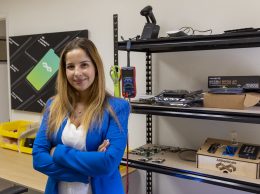Lynda.com boots up with $103M in fresh capital
IN THIS ARTICLE
- Technology Topic
- Stephen Nellis Author
By Stephen Nellis Friday, January 18th, 2013
In a move that could change online education, Carpinteria-based lynda.com has raised $103 million from a group of investors and has plans to expand into international markets.
Lynda.com, one of the fastest-growing firms in the Tri-Counties, has never before taken outside investment in its 17-year history. Founded in Ojai by Lynda Weinman and her husband Bruce Heavin in 1995, the company was profitable within two years.
Its revenues grew from $14.3 million 2007 to more than $100 million in 2012. The company now employs 400 people and is headquartered in Carpinteria at a 12-acre campus, with additional offices in Ventura and Calabasas.
Lynda.com provides subscription-based online learning tutorials for topics such as graphic design software and Web programming. The service is used by Fortune 100 companies, higher education institutions, the government and individuals.
Erik Tarkiainen, vice president of marketing at the company, said lynda.com plans to stick with its core areas of expertise but expand its content to keep up with fast-changing software. The company also plans to expand into international markets, he said.
“Right now, 100 percent of our content is English only. And the way technology and software businesses change, it’s pretty limitless in terms of content and courses that would be covered,” Tarkiainen said. “That’s what this investment is really about.”
The massive influx of funding comes at a time when traditional education is undergoing a digital overhaul.
“Conventional education is going to leverage technology more and more. We are a different type of education that doesn’t revolve around grades or around getting a degree,” Weinman told the Business Times in 2011, when she keynoted the Spirit of Small Business awards luncheon.
“It’s more for self-motivated learners who want to either get ahead in a career, or they want to learn to do something they’ve always wanted to do, or they’ve been asked to do something they don’t know how to do,” she said. “When we thought of education in the past, you had to go away from your life and go to a school and be in a classroom. I think putting education on the Internet democratizes it in a more efficient way.”
But the relationship between schools and lynda.com isn’t remotely adversarial. In fact, the company boasts that 44 of the nation’s top 50 universities are among its clients. The company has positioned itself as a complement to traditional education rather than a replacement. Students learn to use software at home so they can focus on deeper concepts with a live instructor. “Teachers can help with difficult concepts and that part of education. We can help with things like tools and software,” Tarkiainen said.
Jo Anne Miller, a San Luis Obispo-based venture capitalist who has a stake in one educational technology company and has evaluated others, said schools with strapped budgets are looking for ways to deliver better value to students. Technology is a part of that process. “I don’t think there’s anyone really saying the face-to-face learning experience is going to go away. It’s just how to make it more effective and how to deal with the many educational problems that still exist,” Miller said.
Lynda.com does just those things, Miller said. While there are free online courses in core subjects such as physics from schools such as Stanford and MIT, lynda.com’s focus on ever-changing technology means that it has a recurring revenue stream baked into the model, Miller said.
“Specialized content that has a short shelf life is of higher value than general content that has a long shelf life,” she said. “When you have a technology that you have to learn right now, you’re going to pay more for it.”
That points to another success at lynda.com: The firm is essentially a content company with a paywall. Tarkiainen said the success of that model stems from producing the best content possible and then charging a fair price for it so that customers find it to be a good value. He said maintaining that model will be a high priority as the company expands into international markets.
Quality control “is something that’s absolutely differentiated us from free offerings. We don’t want to syndicate. We want to be able to have that control and ownership” over the content, Tarkiainen.
The new investment capital will mean new hires and offices. Tarkiainen said some of those offices will be in other areas but there will also be hiring at the company’s headquarters.
“We love being in this area,” he said. “We’ll continue to hire as needed. We have a great campus, a great culture, and there’s a real value for the employees to be based here where they can benefit from things the company provides.”
The investors in lynda.com are Accel Partners, a global venture capital firm, and Spectrum Equity, a growth-equity firm focused on the information economy. Andrew Braccia of Accel and Vic Parker of Spectrum have joined the the firm’s board of directors. The board also includes Weinman; Heavin, co-founder and chief creative officer; Eric Robison, president and CEO; and Bud Colligan, former CEO of Macromedia and current Accel Venture Partner.
Tarkiainen said the company’s existing management is expected to stay in place. He also said that lynda.com’s uniquely creative culture will continue. With no previous outside investors to answer to, Weinman and Heavin were free to build the company according to their own vision and rules.
“When you take on investment, you accept responsibility for those stakeholders,” Tarkiainen said. “Our brand and our culture and our principles won’t change. We’ve taken this investment at a time when we’ve proven that this model has created a successful company.”
Related Articles
 Friday, September 30th, 2022
Friday, September 30th, 2022
In the region and the nation, women get a tiny share of venture capital dollars
 Monday, September 19th, 2022
Monday, September 19th, 2022










